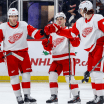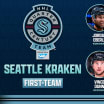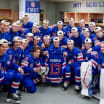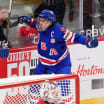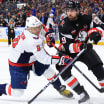For additional insight into the Western Conference Final between the Anaheim Ducks and Nashville Predators, NHL.com has enlisted the help of Perry Pearn to break down the action from the Predators' perspective. Pearn will be checking in throughout the series.
Pearn, 65, has worked 22 seasons as an NHL assistant with the Vancouver Canucks, Ottawa Senators, New York Rangers, Montreal Canadiens and Winnipeg Jets. He began his NHL career as an assistant in Winnipeg in 1995-96.
Coach's analysis: Predators must find positives for Game 5 vs. Ducks
Former NHL assistant Perry Pearn says goalie Pekka Rinne, forecheck could overcome loss of Ryan Johansen
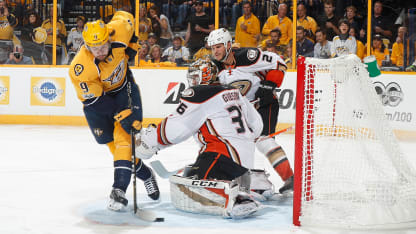
© John Russell/Getty Images
NASHVILLE -- The relationship between the physical and mental aspects of the Stanley Cup Playoffs was on display in Game 4 of the Western Conference Final between the Nashville Predators and Anaheim Ducks here Thursday, according to former NHL assistant Perry Pearn.
The how and why of the first period, when the Ducks outshot the Predators 14-2 and outplayed them significantly before winning 3-2 in overtime to tie the series 2-2, is the kind of intrigue that keeps coaches and players up at night, Pearn said.
"Anaheim came out for that game way harder than any other game of the series," Pearn said. "To me, in that first period, my sense watching as a coach was that Anaheim was the more desperate team and you would expect that.
\[RELATED: Complete Predators vs. Ducks series coverage\]
"Game 4 was a pivotal game. Should Nashville have gone ahead 3-1, that's a big mountain to climb for any team. Not impossible, but a big mountain. But from Anaheim's perspective, getting it back to 2-2, now they go back home and they put the pressure on Nashville. If the Ducks win the next one, Nashville will be under the gun, the same one Anaheim was under Thursday."
Game 5 of the best-of-7 series is in Anaheim on Saturday (7:15 p.m. ET; NBC, CBC, TVA Sports).
Pearn said the Ducks deserve credit for their strong start to Game 4 and for scoring the first goal.
"When Anaheim gets ahead it changes the game a bit," he said. "Going forward Nashville getting the first goal sets them up to win a lot easier than if they fall behind."
It wasn't surprising to Pearn that the Ducks played better in Game 4 than they did in their 2-1 loss in Game 3. So why were the Predators unable to match the Ducks' start after their solid Game 3?
"That's why the game just isn't a physical game," Pearn said. "There's a physical battle every second night. But the more important battle is the mental battle.
"In the years I was involved with teams that went deep [into the playoffs], it was about being focused on the day of the game and decompressing on the days you didn't play. It's all about trying to keep that rhythm of being up, then relaxing enough to get your rest and be in a mental state where you can get back to that high level of mental awareness and intensity that you need to win another game.
"I think Nashville's done a good job of it to this point in time. Nobody should beat themselves up too much over what happened. Nashville is facing a team that's experienced in this, some of them to the point where they've won the Cup."
Pearn said one positive for the Predators is that, though Ducks had a 40-35 edge on faceoffs in Game 4, Nashville went 14-12 in the defensive zone, the third straight game it has had the advantage there. Center Ryan Johansen won 14 of 26 faceoffs (53.8 percent) but will miss the remainder of the playoffs after having surgery to repair a thigh injury sustained during the game.
"When [the Predators] win those it has made a difference for them," Pearn said. "The other area where faceoffs are most important is when Nashville's winning offensive-zone faceoffs. With their split defensemen and how mobile they are, they cause Anaheim a lot of problems. It has created opportunities. It's also guys away from puck who are helping win draws and that's helping them."
Pearn also said the adjustment Nashville made with its forecheck in Game 4 was successful.
"Anaheim likes to use the D-to-D (passing from defenseman to defenseman) in neutral-zone situations and even breakouts," he said. "When they don't have anything, then they go back to the [defenseman] and will [start] again.
"Partly due to Nashville getting behind, they started to put more pressure on the two Ducks defensemen, using a second forechecker. That was effective for them and you may see them continue to do that."
Predators goalie Pekka Rinne had 34 saves in Game 4, and Pearn thought he was in good form again after he allowed some odd goals in Game 2.
"I think it's worth mentioning, and didn't hear this on TV, that on Anaheim's second goal [Thursday], by Nick Ritchie, I thought the shot went off [Predators defenseman] Roman Josi's shin pad," Pearn said. "And on that overtime goal, you could see [Predators defenseman] P.K. Subban deflected the puck. I thought Rinne played very well [Thursday] night, [and] is clearly back on his game."
Nashville went 0-for-5 on the power play but Pearn said the numbers are deceptive. The power play generated momentum that was important to what happened in the third period, when the Predators scored twice in the final 6:27 to tie the game.
"They got the building going," he said. "The one thing you don't want to do is to have done nothing on the power play. That's an emotional downer for the bench. But if you put on pressure it's something to build off. So you have to give their power play credit for generating momentum."


